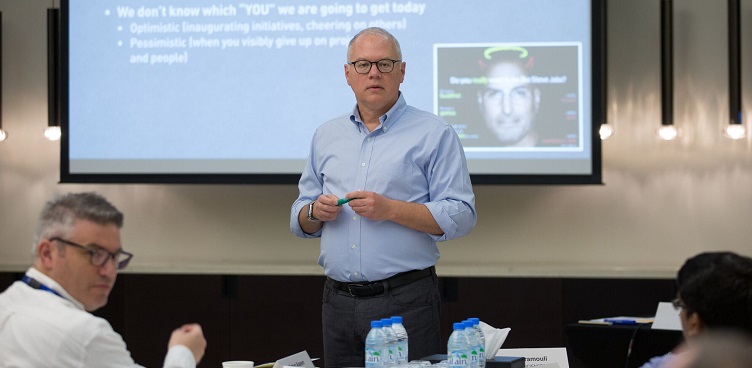How do leaders shape the culture of an organization?
The first step is to acknowledge that your company has a culture, and it can be defined as ‘what people say and do when they think you are not looking’, said Professor John Weeks at Orchestrating Winning Performance in Dubai.
“Your organization has a culture whether you want it or not. It emerges from interactions between employees. And you influence it whether you want to or not. You’re influencing it through what you’re saying, what you’re rewarding. And usually, you are making it worse, not better.”
The good news is that “it’s a myth that this culture cannot be changed. The challenge is how you can shape it.”
It’s also a reality that the more senior you get, the more time people spend watching what you are doing. So even if you don’t mean to be a role model, said Weeks, you are. “People are looking at your body language and trying to figure out what you’re not saying.”
Great teachers
Crucially, it’s also possible that an individual can be a good person, even a good leader, and not be a good role model.
“Role modelling is not a side-effect of leading,” said Weeks, “it’s a skill you can learn.”
The best role models share certain characteristics, Weeks added. “Great role models are teachers, able to explain what they are doing and why. But while it’s not true that all teachers can be great leaders, it is absolutely true the other way around.”
We should be able to see things in our role models that we would like to incorporate into our own behavior. It’s also important to remember that actions matter more than words – great leaders make their behaviors visible, in big and small ways.
Being unique is not important, Weeks said, citing Andy Grove, former CEO of Intel, who said that to succeed, you have to be able to disagree with the people around you. But once a decision has been made, those people need to commit to that decision, regardless of whether they agree or disagreed with you in the first place.
Jeff Bezos agreed – “have a backbone”, he said.
Don’t forget that consistency is important, said Weeks. Bad behavior leaves a stronger impression than good behavior, so building credibility takes time and it never stops if you don’t want people to lose faith in you.
Derailing behavior
In times of stress or if something that happens to us that is embarrassing, you may lose your calm and act in a way you regret, Weeks said. You may ‘derail’ yourself.
These derailers are often dysfunctionally extreme versions of attitudes and behaviors that are normally part of what makes us successful. “They are an extension of what is good,” he said.
So what are they? Research carried out by psychologists Robert and Joyce Hogan two decades ago pinpointed 11 of traits that, when triggered or taken to the extreme, can derail us on our quest to become a successful leader.
- Bold (which can lead us to behave overly self-confident, entitled)
- Cautious (unassertive, resistant to change)
- Colorful (dramatic, attention-seeking)
- Diligent (meticulous, precise)
- Dutiful (eager to please, reluctant to act independently)
- Excitable (moody, easily annoyed)
- Imaginative (thinks and acts in unusual or eccentric ways)
- Leisurely (Overtly cooperative but privately irritable, stubborn)
- Mischievous (Risk-taking, limit-testing)
- Reserved (Aloof, indifferent to the feelings of other)
- Skeptical (Distrustful, sensitive to criticism)
Like all bad habits, they have become automatic, and may provide some short-term benefit. We all have these derailers, and usually we cannot change them – but we must be able to recognize them and manage them.
So what happens if your derailing trait is triggered?
When we find ourselves in a situation that we don’t like or upsets us, research shows that we have to wait 10 seconds to avoid our derailing behavior being unleashed. Unfortunately, we don’t often have that long, Weeks said.
If you feel ‘triggered’, the best response is to ask a question, he suggests, as this will buy you the time you need for things to die down.
Changing habits
How can we give ourselves the best possible chance to change these habits that threaten to derail us?
“Most of us have tried to change a habit at some point in our lives”, said Weeks. “We all have some experience. So what have we learned?”
Solutions put forward during the session, drawing on Charles Duhigg’s ‘The Power of Habit’, included the need to be as specific as possible with your goal.
“It’s not enough to say that you want to lose weight,” he said. “You have to be more specific. Or it’s not enough to just say I need to listen to people but saying ‘I need to listen to people in my weekly meeting and don’t interrupt’ is more likely to succeed.
“Take something fuzzy like ‘don’t be rude’ and turn it into, ‘when I’m in a situation when there is a lot of emotion, I should not lose my temper.”
Another method is to reward yourself. “One of the most powerful motivators is a sense of progress,” Weeks said. “If you have a big goal, give yourself rewards along the way, congratulate yourself. It helps if you feel like you have a sense of momentum.”
Research shows that if you can do something for 60 days in a row, it could become habit, depending on how hard it is, said Weeks.
But it is possible to put in place triggers, or clues, that will set off the good behavior that you want to introduce. “Habits are a stimulus response” said Weeks. “Leave your running shoes by your door if you want to go running in the morning. If you have to step over them, it has to become a conscious decision not to run.”
Finally, ask yourself, do you believe enough in the change to stick with it, even through times of stress? If not, it’s unlikely to be there for you when you need it.




